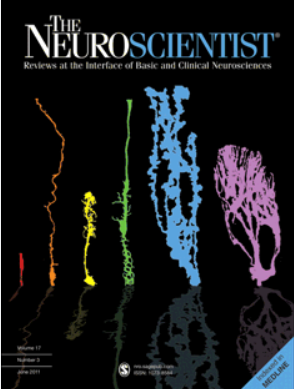神经科学与行为透视。
IF 3.5
3区 医学
Q1 CLINICAL NEUROLOGY
引用次数: 0
摘要
本文章由计算机程序翻译,如有差异,请以英文原文为准。
Perspectives on Neuroscience and Behavior.
Schizophrenia (SZ) and bipolar disorder (BPD) have many common clinical features and they have shared polygenetic risks. An improved understanding of the common neurobiological pathways involved would be an important advance. Now, this has been accomplished in an outstanding study where it was found that SZ and BPD have upregulation of miR-124-3p in olfactory epithelium derived neuronal cells and postmortem prefrontal cortex, and that this was associated with shared polygenetic risks of the two disorders. In a mouse model with upregulation of miR-124-3p in the medial prefrontal cortex (mPFC) there was increased GRIA2lacking calcium-permeable AMPA receptors (AMPARs) and the mice had impaired social interaction and increased sensitivity to amphetamine. The increase in GRIA2 lacking calcium-permeable AMPARs increased the post-synaptic conductance of AMPARs and miniature excitatory postsynaptic currents (mESPC) amplitude. The selective antagonism of GRIA2-lacking calcium-permeable AMPARs by Naspm normalized the increased amplitude of mESPCs, and local infusion of Naspm into the mPFC reduced the behavioral deficits in social interaction and amphetamine sensitivity. Adeno-associated virus mediated expression of GRIA2 in mouse prefrontal cortex excitatory neurons reduced the behavioral defects (Namkung and others 2023). This article is an outstanding example of how the focus on neurobiological mechanisms underlying behavioral dimensions can improve our understanding of key biological pathways involved in the pathogenesis of behavioral abnormalities. This in turn provides new opportunities for the development of more efficacious therapeutic interventions.
求助全文
通过发布文献求助,成功后即可免费获取论文全文。
去求助
来源期刊

Neuroscientist
医学-临床神经学
CiteScore
11.50
自引率
0.00%
发文量
68
期刊介绍:
Edited by Stephen G. Waxman, The Neuroscientist (NRO) reviews and evaluates the noteworthy advances and key trends in molecular, cellular, developmental, behavioral systems, and cognitive neuroscience in a unique disease-relevant format. Aimed at basic neuroscientists, neurologists, neurosurgeons, and psychiatrists in research, academic, and clinical settings, The Neuroscientist reviews and updates the most important new and emerging basic and clinical neuroscience research.
 求助内容:
求助内容: 应助结果提醒方式:
应助结果提醒方式:


